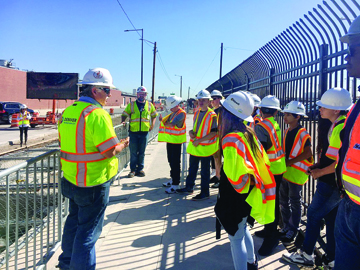Corrupt Bidding For Convention Center Expansion Alleged; City Auditor Now Scrutinizing On-Call Construction Contracts
by Glen Richardson
Denver’s reputation as one of the Best Places to Live — Ranked #1 by US News & World Report in 2016 — has been dealt another blow. Outdoor activities, proximity to the mountains, art, craft beers and marijuana that draws visitors to our city and distinguishes it from its metropolitan colleagues has been compromised by the Convention Center expansion scandal.

The scandal uncovered last November amounts to dereliction of duty by the City’s Public Works division delivering the services that help define the quality of life in Denver. Public Works said that it discover-ed the bidding process to pick a contractor for the project had been interfered with. Reportedly there was an improper release of city documents, improper discussions about the process and even altering of approved plans. The city claimed two companies, Trammell Crow and Mortenson, tainted the bidding. In response the companies retorted: “If Denver was truly unaware of Trammell Crow’s conduct, it was the City’s lapse in oversight that created the situation.”
The City’s Public Works is responsible for the design and construction management of streets, bridges and public buildings plus transportation through its offices of parking management, transportation planning and operations.
On-Call Audit
Since then a newly completed examination and audit of Public Works by City Auditor Timothy M. O’Brien, CPA, reveals the branch needs to improve contract competitiveness and enforce policies during the bidding process while working on some on-call contracts. “It’s in the best interest of the taxpayers to keep a close eye on the new construction projects going on with all the new bond money,” Auditor O’Brien explains. “I decided it was important to start auditing on-call construction contracts in a way we hadn’t before, to make sure we’re getting what we pay for and that we’re using a truly competitive process.”

Unconventional Contract: Apparent misconduct in the bidding process for expansion at the Colorado Convention Center has Denver Public Works under scrutiny. Denver has reopened bidding and it is unknown whether pre-booked events will be affected by construction delays.
The Auditor’s Office worked with CliftonLarsonAllen LLP to complete a third-party examination with limited scope of Halcyon Construction’s on-call contract with Public Works. Halcyon had an agreement with Public Works for up to $3 million to cover work between May 1, 2015, and April 30, 2018. According to the examination, Public Works should expand its pool of contractors to allow for a more competitive environment and for more opportunities for other contractors to be considered for work. Public Works should also make sure to follow the requirements of its mini-bid process, which was not used at all on some projects.
The examination also found significant increases in project costs due to change orders from Halcyon. The company had a considerably higher percentage of change orders than the other small business enterprise contractors in the bidding pool. In some projects tested, the change order amounts plus the original work order resulted in the total project cost being higher than other contractors’ bids submitted during the mini-bid process. Halcyon’s percentage of change orders through November 2018 was 27%, compared to other contractor percentages of 3.5%, 8.3%, and 8.2%. Furthermore, for three of the projects tested, the project managers could not locate any formal documentation evidencing that inspections were performed during these projects that could identify when performance was not in line with the work order.

Directional Disarray: Bidding scandal and political meddling has created chaos within the 1,300 employee Denver Public Works department. Leadership’s focus is on the politically motivated Mobility Action Plan rather than management of City’s building and street design and construction.
Ordinance Delayed
Problems with construction management by Denver Public Works was first reported by District 10 City Councilman Wayne New last summer and published in a front page August 2018 Chronicle article. A construction management ordinance was drafted by New at that time and was finally announced by Public Works on March 27, six months later. Implementation of the new Public Works procedures will likely begin at an equally sluggish pace.
“There is no doubt now that the problems have resulted from Public Works’ inability to require pre-permitting and pre-construction planning and construction management agreements regarding area traffic flow, street closure, parking meter management, defined offsite parking arrangements and noise mitigation,” New said then.

Main Man: Director Eulois Cleckley is central figure in problem-plagued Denver Public Works department. He is the hand-picked protégé of Mayor Michael Hancock.
The City Councilman says now as he did six months earlier, “it is my hope the ordinance will mitigate the trials and tribulations businesses and residents have experienced in Cherry Creek and throughout the City.”
Biking Boondoggle
The high-profile Executive Director of Public Works Eulois Cleckley — the hand-picked protégé of Mayor Michael B. Hancock — has emerged as a central figure in the growing glitches and uproar within the 1,300 employee Public Works department. He was chosen to implement Hancock’s Mobility Action Plan and thus take attention away from the City’s knotty high-density developments. That job, department insiders say, he has been successfully completing.
Hancock, Cleckley and Councilwoman Mary Beth Susman are now proposing the creation of a new Department of Transportation & Infrastructure. Unlike restructuring the department of Public Works, it will likely require voter approval but would push a rumored “in-the-works $900 million bond issue.” Meanwhile the City’s 2019 budget includes $27 million for transportation and mobility improvements including more than $7 million to build more and more bicycle lanes.

Akin to the unmanaged developments being built in almost every Denver neighborhood, new bike lanes are also clogging traffic and destroying commerce. Bicycle lanes on 14th and 15th Streets in Denver have stolen space from motorists and only made downtown traffic worse, particularly in proximity to hotels and public attractions. Lanes on South Broadway that cost roughly $13 million seem superfluous and have crushed business along the corridor. Owner Ron Vicksman of LeGrue’s — a Broadway landmark for nearly a century — attributed his decision to close after all those years was due to the loss of parking spaces following installation of the bike lanes. Vehicle registration fees, ownership taxes and gasoline excise taxes are big revenue raisers but bicycles aren’t contributors. Critics thus argue they are nothing more than a form of social engineering.

